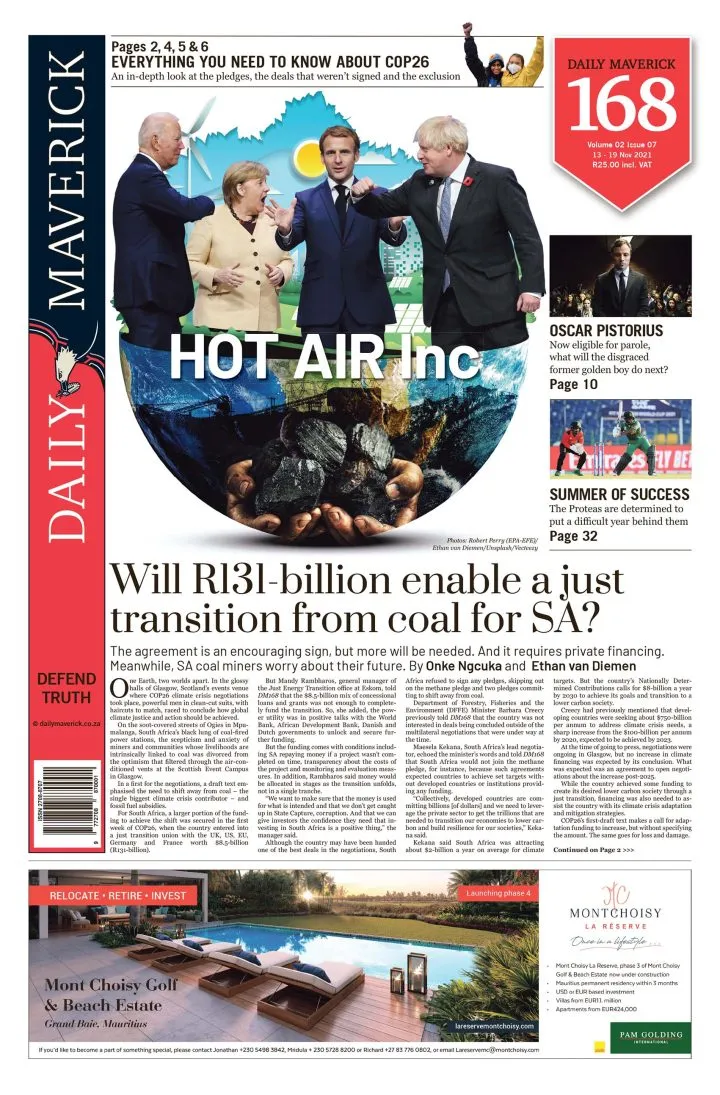COP26
Hot Air Inc: Will R131-billion enable a just transition from coal for South Africa?

Just transition agreement is an encouraging sign, but more will be needed. And it requires private financing. Meanwhile, SA coal miners worry about their future.
One Earth, two worlds apart. In the glossy halls of Glasgow, Scotland’s events venue where COP26 climate crisis negotiations took place, powerful men in clean-cut suits, with haircuts to match, raced to conclude how global climate justice and action should be achieved.
On the soot-covered streets of Ogies in Mpumalanga, South Africa’s black lung of coal-fired power stations, the scepticism and anxiety of miners and communities whose livelihoods are intrinsically linked to coal was divorced from the optimism that filtered through the air-conditioned vents at the Scottish Event Campus in Glasgow.
In a first for the negotiations, a draft text emphasised the need to shift away from coal – the biggest climate crisis contributor – and fossil fuel subsidies.
For South Africa, a larger portion of the funding to achieve the shift was secured in the first week of COP26, when the country entered into a just transition union with the UK, US, EU, Germany and France worth $8.5-billion (R131-billion).
But Mandy Rambharos, general manager of the Just Energy Transition office at Eskom, told DM168 that the $8.5-billion mix of concessional loans and grants was not enough to completely fund the transition. So, she added, the power utility was in positive talks with the World Bank, African Development Bank, Danish and Dutch governments to unlock and secure further funding.
But the funding comes with conditions including SA repaying money if a project wasn’t completed on time, transparency about the costs of the project and monitoring and evaluation measures. In addition, Rambharos said money would be allocated in stages as the transition unfolds, not in a single tranche.
“We want to make sure that the money is used for what is intended and that we don’t get caught up in State Capture, corruption. And that we can give investors the confidence they need that investing in South Africa is a positive thing,” the manager said.
Although the country may have been handed one of the best deals in the negotiations, South Africa refused to sign any pledges, skipping out on the methane pledge and two pledges committing to shift away from coal.
Department of Forestry, Fisheries and the Environment (DFFE) Minister Barbara Creecy previously told DM168 that the country was not interested in deals being concluded outside of the multilateral negotiations that were under way at the time.
Maesela Kekana, South Africa’s lead negotiator, echoed the minister’s words and told DM168 that South Africa would not join the methane pledge, for instance, because such agreements expected countries to achieve set targets without developed countries or institutions providing any funding.
“Collectively, developed countries are committing billions [of dollars] and we need to leverage the private sector to get the trillions that are needed to transition our economies to lower carbon and build resilience for our societies,” Kekana said.
Kekana said South Africa was attracting about $2-billion a year on average for climate targets. But the country’s Nationally Determined Contributions calls for $8-billion a year by 2030 to achieve its goals and transition to a lower carbon society.
Creecy had previously mentioned that developing countries were seeking about $750-billion per annum to address climate crisis needs, a sharp increase from the $100-billion per annum by 2020, expected to be achieved by 2023.
At the time of going to press, negotiations were ongoing in Glasgow, but no increase in climate financing was expected by its conclusion. What was expected was an agreement to open negotiations about the increase post-2025.
While the country achieved some funding to create its desired lower carbon society through a just transition, financing was also needed to assist the country with its climate crisis adaptation and mitigation strategies.
COP26’s first-draft text makes a call for adaptation funding to increase, but without specifying the amount. The same goes for loss and damage.
“Our countries are now faced with multi-year droughts, loss and damage, floodings, etc. So we need to adapt to those impacts and to put those adaptation measures, we need funding. But adaptation generally does not attract private-sector financing; it becomes a problem,” Kekana said.
“You can’t make money from adaptation. Mitigation – you put a renewable energy power plant, sell to Eskom, you make money, hence the investment into mitigation. But adaptation … nobody is going to make money out of that.”
Kekana said adaptation should come in the form of grants and not concessional loans. “Because we did not cause this climate change. Historically it was from the North, so we need to see the North pumping money into our adaptation measures,” Kekana said.
Creecy said a balanced outcome between adaptation, mitigation and adequate climate financing was the goal of COP26.
Only one of those targets has been partially met, because developed countries failed to increase their climate financing to developing countries. Instead, in the second-draft text of the conference, they called on private financing to play their part.
Prabhat Upadhyaya, senior policy analyst with WWF South Africa, told DM168 that the news of the just transition agreement was welcome, but that details on the partnership will be split into a loan and a grant, so the public-private distribution would be watched closely.
“It should also be noted this is not only about a just energy transition but also about funding for green hydrogen electric vehicle manufacturing. We recognise this is a first important step on the path to a resilient and net-zero South African economy. The next challenge for South Africa will be to develop concrete plans and commensurate institutional capacity,” Upadhyaya said.
It’s a just transition which is not just, because as workers the level in which we are communicated with, it’s not proper, it’s not enough. Even the workers, even the community around Komati, they are worried. They only got rumours that in 2022 Komati will be closed. So it means it needs to be a matter of improving in the communication side of it, to say people must know what will happen there. Then the ‘just transition’ will be just.
Happy Khambule, a senior political adviser at Greenpeace Africa, was concerned that the partnership did not mention whether the aim for decarbonisation will include gas or not.
“The deal is quite interesting. The amount which has been allocated to address the problem is far too small. When you look at it, you have to consider that, just in the electricity sector, one player holds about R400-billion worth of debt that is sitting there… Unusable assets, as well, that are hanging around,” the analyst said.
“The partnership, if it is seen as a catalyst for more mobilisation in finance, then it’s a good thing. But then if it’s not … it doesn’t really address the scale of the issue,” Khambule said.
The jury is out on whether South Africans gained anything more than the landmark $8.5-billion mix of concessional loans and grants partnership agreement through its COP26 negotiating team. The impact of the agreement will also only be felt when Eskom kickstarts its just transition plan.
According to Rambharos, the first steps will be to expand feasibility studies in communities directly impacted by the closure of plants to ensure that socioeconomic damage is limited, as per the conditions of the funding.
“We’ll start with that small pot and as we progress we will require more money. But all of that money is not just for infrastructure development. It’s also for the broader … social investment; dealing with communities in terms of repurposing, repowering power stations and injecting money into local manufacturing in those communities as well,” the general manager said.
Most of the communities located around Eskom plants are small, impoverished and polluted by the very hand that feeds them.
Speaking to DM168 this week, coal miners in SA’s power-generating heartland were worried about a transition away from coal.
“If the [coal] mines close, we will vanish. You won’t see anything. The businesses you see here are supported by people, those people who are working for the mines. It’s going to kill the business, everything.”
These are the words of a 29-year old coal miner standing outside a liquor store, sipping on a cold beverage on a sweltering November day in the tiny coal-mine-adjacent town of Ogies, Mpumalanga.
The man, who asked not to be named in fear of losing his job, is threatened by the possibility that South Africa’s increasingly urgent energy transition might not be just. For him and the 200,000 formal workers across the coal value chain in Mpumalanga, the prospect of coal purposefully and increasingly being left in the ground is a vexatious thought.
His 37-year-old colleague, an artisan in training, who also asked not to be named for fear of reprisal, asked about plans to rapidly phase out coal, saying “pollution is bad, I agree, but for the economy [coal] is sharp”.
“You see we are surviving because we are working with the mines so it created a lot of opportunities for a lot of people here, so a lot of people can afford cars, support their family… So if they cut [coal], we’re gonna starve.”
The people employed along the coal value chain are emblematic of the need for the transition to be just and well funded.
Bongikosi Gina, an employee at Masekane Liquor Store, is one of those 200,000 workers along the coal value chain. But a few kilometres away from Eskom’s Duvha Power Station, he is already feeling the impact of a reduced workforce. There are fewer contractors working at the power station, he said, and they and other locals constitute the lion’s share of the people who frequent the business.
Gina added that, if Eskom should shut down the Duvha coal-fired power station or if the coal mines around the Masekane area ceased operations, his liquor store business would struggle and the people who depend on him would suffer the consequences.
DM168 asked the 29-year-old coal miner what the impact of closing mines would have on the area. He said: “No, it’s going to be bad. Because I think 80% of the people around this area are mining-based so if they take it away … ja, eish. My family will suffer. It’s not only my family; people depend on me because now I’m providing for maybe two or three families.”
Closing the mines is not a solution, he said. “They must come with a plan where they can reduce that pollution. Now you’re complaining about load shedding, but you’re cutting coal. It’s not only the mine industry that is going to lose business, the people there working at the power stations are going to lose jobs. In those power stations, how many families are going to suffer?”
David Fankomo, full-time shop steward for the National Union of Mineworkers (NUM) at Komati Power Station and former employee at the power station, said that although the NUM was in agreement with the intended outcome, they had concerns about the process element of the just transition.
“It’s a just transition which is not just, because as workers the level in which we are communicated with, it’s not proper, it’s not enough. Even the workers, even the community around Komati, they are worried. They only got rumours that in 2022 Komati will be closed. So it means it needs to be a matter of improving in the communication side of it, to say people must know what will happen there. Then the ‘just transition’ will be just.
“Is there any surety that our jobs will be safe? If so, how? You see, there must be a plan, but we don’t have such. That is our worry,” said Fankomo.
That a full-time shop steward in a power station 10 months away from being decommissioned was not fully apprised of the larger transitional plan seemed an indication of a bigger disconnect.
He explained that many of the workers on the ground that he represents feel that the South African government is kowtowing to the international community at their expense.
“Why don’t they tell the world ‘Let’s consult, consult, let’s make sure our people are happy…’ As a shop steward, I am dealing with people on the ground who will be asking me a simple question: What will happen with my job, is my job safe?” DM168
Additional reporting by Ethan van Diemen.
This story first appeared in our weekly Daily Maverick 168 newspaper which is available for R25 at Pick n Pay, Exclusive Books and airport bookstores. For your nearest stockist, please click here.




















 Become an Insider
Become an Insider
If history is anything to go by:
1. The money will have strings attached that restrict projects to using vendors from the lender countries.
2. A large chunk of the money will be eaten up in advisory and bank fees.
3. The foreign vendors will be required to partner 49% with a cadre company, creating more bang-for-buck friction losses for enrichment.
Lets see how many parties, building refurbishments, personal security systems, school fees, party rallies, retirement parties, ghost workers and more it will take the ruling party to use up all the money before anyone knows where its gone!